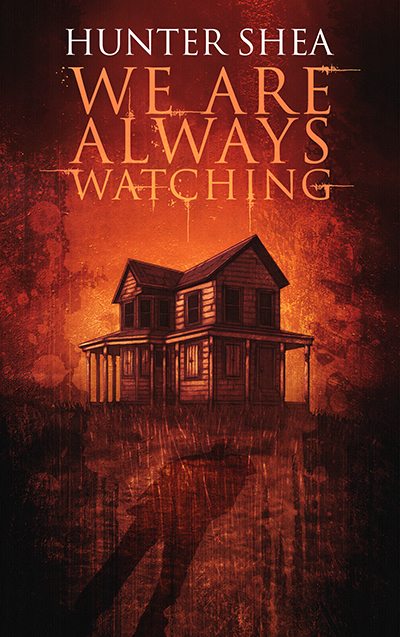We Are Always Watching
Hunter Shea
Sinister Grin Press
March 17, 2017
Reviewed by C.M. Saunders
Apart from the stunning cover art, I was most intrigued by the premise and back story of this new offering from Sinister Grin Press, who are fast building an impressive catalogue of quality releases. We Are Always Watching smacks of a classic psychological horror fest, with a whole array of horrors bubbling just beneath the surface.
When the patriarch develops a crippling case of vertigo as the result of a car accident and various other mini-tragedies befall them, 14-year old West and his family are forced to move in with his eccentric grandfather in his run-down Pennsylvania farmhouse, which is rumoured to be haunted. Being a paranormal enthusiast, this revelation actually excites West rather than fills him with dread. Despite being obsessed with horror movies and metal music, he immediately strikes you as a conscientious and sensitive young man, the upheaval only adding to his usual array of teenage problems and emphasising his darkest material fears and insecurities.
After the move, as West falls hopelessly in lust with a local girl he meets called Faith, but as we all know, the path to true love rarely runs smooth, especially in a teenage wasteland. Added to this, the family soon learns that the old farmhouse has been plagued by death and tainted with misery for generations, which may go some way toward explaining the fractured relationship between West’s incapacitated father and grouchy grandfather. Things get a whole lot worse when creepy notes and messages start turning up, proclaiming to be from the Guardians, a mysterious cabal who have apparently been watching the property, for reasons unknown, for as long as anyone can remember. The thought of someone investing that much time and energy just watching you for reasons unknown is enough to give anyone shivers. But the truly fascinating thing about this aspect of the book is that it’s based on fact. According to a newspaper article, when a stately home was put up for sale in Westfield, New Jersey several years ago, it came complete with “six bedrooms, wood flooring, and a disturbing back story that left its last owners living in fear of a stalker who sent them a series of cryptic, threatening letters.”
The writer of the letters claimed to be the latest in a long line of ‘watchers.’ They wanted to know whose bedroom faced the street, and criticized renovations that made the home more “fancy.” Shockingly, the letters even hinted that the writer had accumulated personal information including the identities of the family’s child: “I am pleased to know your names now and the name of the young blood you have brought me.”
With West being such a horror buff, the book is littered with pop culture references which should be familiar to most connoisseurs of the dark and twisted, from Richard Laymon to Horrorhound magazine, something which adds another dimension to the writing as well as an extra layer of realism. Another thing which makes a tangible difference is the limited cast of characters, at least in the first half of the book, which allows the author to explore each one in a lot more depth. The result is that the reader builds up thoroughly fleshed-out mental pictures, and actually begins to care about the characters. Throughout the book, Hunter Shea taunts and teases expertly, much like the Guardians he writes about (though much less intrusively), dropping clues and red herrings as he goes. At times, We Are Always Watching morphs into cozy mystery territory, and more-or-less manages to avoid the gross-out blood and guts route so often employed by less sophisticated writers.
This kind of subject matter is a bit of a departure for Shea, who has thus far built an impressive career based mainly on creature fiction with the likes of Loch Ness Revenge, The Jersey Devil and The Montauk Monster. Not to take anything away from his other work, We Are Always Watching showcases a different kind of writing. It’s more subtle and atmospheric, sucking you into the story. There are a few shocks along the way to spice things up, which punctuate a lovingly textured ominous, creeping unease. My only complaint would perhaps be that as the story nears its extended climax, the realms of plausibility are stretched to breaking point. But of course, you could argue most horror novels do the same thing. The genre practically necessitates a suspension of reality. This one does it better than most, and is well worth a look.
- We Are Always Watching – Book Review - April 11, 2017
- Lost Signals – Book Review - March 16, 2017
- Tales from the Lake Volume 2 – Book Review - April 25, 2016
- Death’s Sweet Echo – Book Review - March 14, 2016
- Their Cramped Dark World & Other Tales – Book Review - February 11, 2016
- Their Cramped Dark World & Other Tales – Book Review - December 10, 2015
- Black Static #46 – Magazine Review - August 12, 2015



